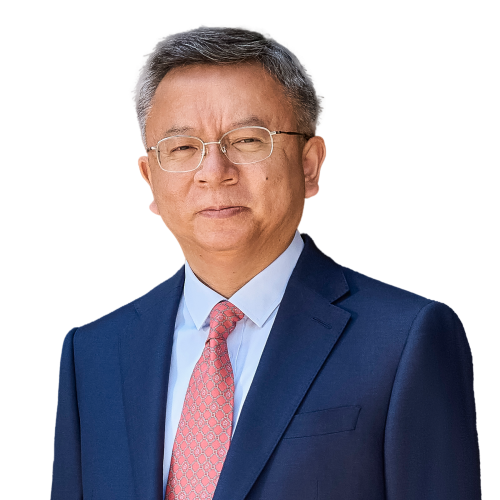Tuesday, Apr 11, 2023 | 12:30 PM - 01:15 PM
Location: HQ1 Atrium, HQ1-1-700
OVERVIEW
The world needs to triple investment in clean energy to achieve the climate goals set at COP26. New concerns about energy security could drive efforts to close this daunting investment gap. Our panel will discuss clean energy finance in the geopolitical context. Does investment in clean energy also address energy security concerns? What are the trade-offs? How can international policy coordination help to ramp up investment, especially in emerging and developing countries? What is the role of private financing in providing clean, affordable, and reliable energy?
Join the conversation via #ClimateFinance
MODERATOR
 |
||
| Michelle Fleury BBC |
||
Michelle Fleury is the BBC's New York Business Correspondent and one of the leading reporters in North America for BBC World News. She's covered American business and economics for more than 10 years, regularly reporting live from the floor of the New York Stock Exchange on financial markets. She has covered many major business stories, including the global financial crisis in 2008 and monetary policy. Over the years she has covered the Federal Reserve, the IMF, World Bank and the World Economic Forum in Davos. As well as speaking at conferences, Ms Fleury has presented a variety of general news programmes on BBC World News, bringing audiences the latest breaking news and events from across the globe. She is a regular face on BBC World News America.
PANELISTS
 |
||
| Bo Li Deputy Managing Director, IMF |
||
Bo Li assumed the role of Deputy Managing Director at the IMF on August 23, 2021. He is responsible for the IMF’s work on about 90 countries as well as on a wide range of policy issues. Before joining the IMF, Mr. Li worked for many years at the People’s Bank of China, most recently as Deputy Governor. He earlier headed the Monetary Policy, Monetary Policy II, and Legal and Regulation Departments, where he played an important role in the reform of state-owned banks, the drafting of China’s anti-money-laundering law, the internationalization of the renminbi, and the establishment of China’s macroprudential policy framework.
 |
||
| Tim Gould | ||
Tim Gould was appointed the Agency’s Chief Energy Economist in 2021. As Chief Energy Economist, he provides strategic advice on energy economics across a wide range of IEA activities and analysis. Mr Gould is also Head of the Division for Energy Supply and Investment Outlooks, in which capacity he co-leads the World Energy Outlook, the IEA’s flagship publication, and oversees the Agency’s work on investment and finance, including the World Energy Investment report. Mr Gould joined the IEA in 2008, initially as a specialist on Russian and Caspian energy, and in recent years has designed and directed the World Energy Outlook together with the IEA’s Chief Energy Modeller while contributing to the Outlook as a principal author. Prior to joining the IEA, Mr Gould worked on European and Eurasian energy issues in Brussels and has ten years of experience in Eastern Europe, primarily in Ukraine. He graduated from Oxford University and has a post-graduate diploma from the School of Advanced International Studies of Johns Hopkins University.
 |
||
| Kampeta Sayinzoga Rwanda Development Bank |
||
Kampeta Sayinzoga has 16 years of progressive professional experience as an international development practitioner in both public and private institutions within Rwanda and the East African Region focusing on designing and implementing reforms. She is currently the Chief Executive Officer of Development Bank of Rwanda Plc. Development Bank of Rwanda Plc (BRD). As a public institution, BRD’s financial development objectives are focused on providing private capital to the private sector in priority sectors of the economy (i.e. Agriculture, Education, Energy, Exports, Housing, climate change and Special Projects). For more than four decades, BRD has been the sole provider of long term concessional finance to the private sector and financial institutions and has facilitated the emergence of innovative private enterprises in priority sectors. Prior to joining the BRD, she was the Director General of the National Industrial Research and Development Agency under the Ministry of Trade and Industry. She served in the Ministry of Finance and Economic Planning for over a decade, including 6 years as the Permanent Secretary and Secretary to the Treasury. Kampeta has also served on the Board of Directors of diverse institutions such as PTA/TDB Bank, the East African Development Bank, Rwanda Eurobond Committee, GT Bank, the National Capacity Building Secretariat, and Rwanda Revenue Authority. She currently serves on the Executive Committee of Rwanda Bankers Association and Economic Policy Research Network. Kampeta holds a Master’s degree in Economic Development and Policy Analysis from University of Nottingham in the United Kingdom.
 |
||
| Daniel Yergin |
||
Daniel Yergin is a respected authority on energy, international politics, and economics, and a Pulitzer Prize winner. He is Vice Chairman of S&P Global, and is chairman of S&P Global’s CERAWeek conference, which CNBC has called “the Super Bowl of energy”. Dr. Yergin’s book The New Map: Energy, Climate and the Clash of Nations is described by NPR as “a master class on how the world works.” He is the author of the bestseller The Quest: Energy, Security, and the Remaking of the Modern World. Dr. Yergin’s book The Prize: The Epic Quest for Oil Money and Power was awarded the Pulitzer Prize, was a number one New York Times bestseller, and has been translated into 20 languages. Dr. Yergin is a member of the board of directors of the Council on Foreign Relations and a trustee of the Brookings Institution. He has a BA from Yale and a PHD from Cambridge University.
 |
||
| Rania Al-Mashat | ||
Dr. Rania Al-Mashat is Egypt’s Minister of International Cooperation as of December 2019, and previously served as the country’s first female Minister of Tourism. Prior to that, she was Advisor to the Chief Economist of the International Monetary Fund. Her other former roles include serving as Sub-Governor for Monetary Policy at the Central Bank of Egypt, Senior Economist at the IMF, Deputy Project Director for the Institutional Reform and Informal Sector Center at the University of Maryland, and Adjunct Professor of Economics at the American University in Cairo (AUC). She has produced several publications on monetary policy, financial stability, and institutional reforms in transition and emerging markets. She represents Egypt as Governor for several international financial institutions, including the World Bank Group, the European Bank for Reconstruction and Development, the Arab Fund for Economic and Social Development, and the Arab Bank for Economic Development. She serves as Alternate Governor of Egypt at the African Development Bank, the Asian Infrastructure Investment Bank, and the Islamic Development Bank. She is also Co-Chair of the MENA Stewardship Board at the World Economic Forum (WEF); and Member of the New Economy and Society Stewardship Board at WEF. She has several board affiliations, including the Egyptian Stock Exchange, the Egyptian General Authority for Free Zones and Investment, the Arab International Bank, the Arab Investment Bank, and the Middle East Economic Association. She received her PhD and MA in Economics from the University of Maryland and BA in Economics from AUC. She has also completed executive education programs at Harvard’s Kennedy School of Government and Oxford University’s SaÏd Business School.